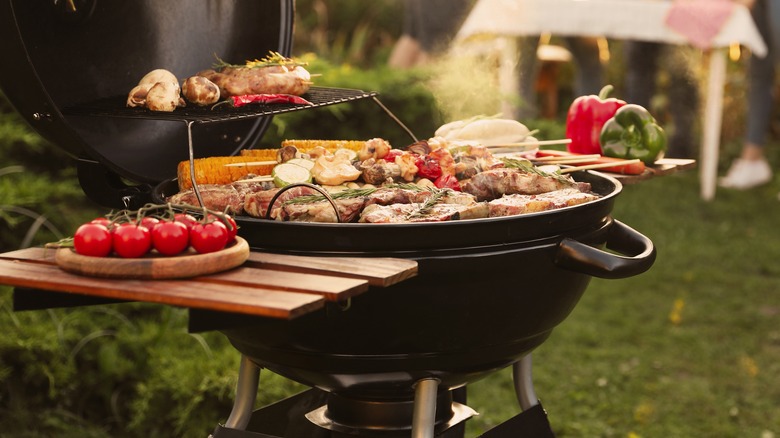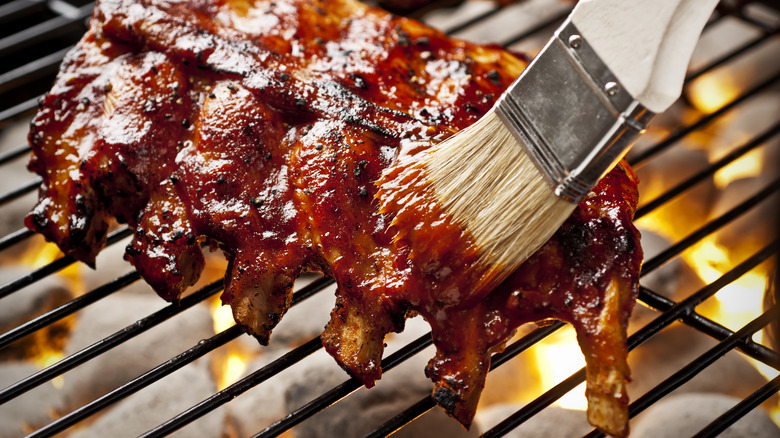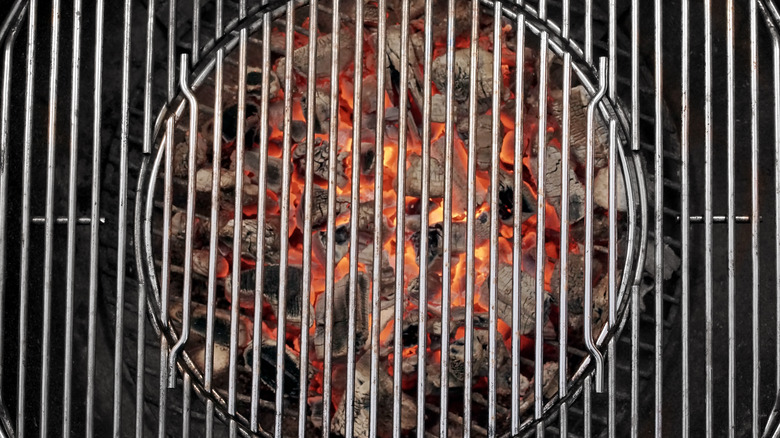Barbecuing And Grilling Are Not The Same Thing
If home cooks should be aware of one thing when it comes to making food, it's likely the consequences of mistaking grilling with barbecuing. This heated debate has even escalated to the point of costing political candidates their public approval, as in 2020 when senate candidate Cal Cunningham angered voters in North Carolina by calling grilled burgers "BBQ" on X, formerly known as Twitter. Cunningham quickly came to learn the key difference that separates the two cooking options, which essentially boils down to time and method.
Barbecuing involves putting large cuts of meat under the low, oftentimes indirect heat of wood coals for a lengthy period of time that can vary from a few hours to a whole afternoon. While not for the impatient, this drawn-out cooking method infuses complex, smoky flavors and breaks down tough connective tissues in meats, resulting in a tender final product that typically does not come out dry.
Grilling, on the other hand, blasts food items directly over a flaming heat source to achieve a crispy sear in just a small amount of time. This combination of high heat and short duration ensures the browning of the exterior while leaving the insides relatively juicy.
Size plays a factor in separating the two cooking methods
Due to its high speed and high heat, cooks often use grilling for smaller cuts of meat such as steaks, burgers, hot dogs, chicken legs, and fish filets. Their small size transfers heat more rapidly, which ensures a quick, convenient sear without the risk of undercooking. This also makes grilling especially useful for temporary outdoor events like cookouts and camping trips, when smaller, portable units may only be available. And, unlike barbecuing, grilling can be used to char veggies on the grill without turning them to mush, especially useful for classics like corn on the cob, asparagus, or even potatoes.
Barbecuing does not share grilling's convenience or versatility, however. Because of its drawn-out cooking process, barbecuing shines best with large cuts like whole racks of ribs or a block of beef brisket, which necessitate long hours to fully cook and soften. In addition, because barbecuing relies heavily on smoking to embed the flavor of the wood coals into food, getting that signature flavor just cannot happen in a short amount of time. Therefore, cooks should consider the size and cut of meat when choosing whether to barbecue or grill their food.
The definition of 'barbecue' differs across the States
To add to the confusion, the word "barbecue" can signify different foods, flavors, and even appliances — depending on the geographic location where it's done. The American South, while widely considered to be the hub of American barbecue, has various contrasting ideas depending on the specific state where the barbecuing happens. For example, North Carolina prefers to use pork as the meat du jour and vinegar-based sauces. On the other hand, Texas barbecue often steers to beef brisket and dry rubs during the cooking process, while Kansas City barbecue opts to lather meats in a syrupy tomato-based sauce at the end. All of these methods use wood blocks over coals as a way to infuse smoky flavor into their end products.
For regions that did not cultivate barbecuing as a mainstay, the word tends to be conflated with the general idea of grilling. Residents in the northern regions of the United States, for example, do not share the same extensive history with barbecuing that their Southern counterparts have, which leads to more people using it as a synonym for grilling. Some English-speaking countries like Australia and Canada also describe grills as barbecues, further blurring the regional definitions between the two cooking methods, though you'll get the best results when knowing the key differences and which method to use.



